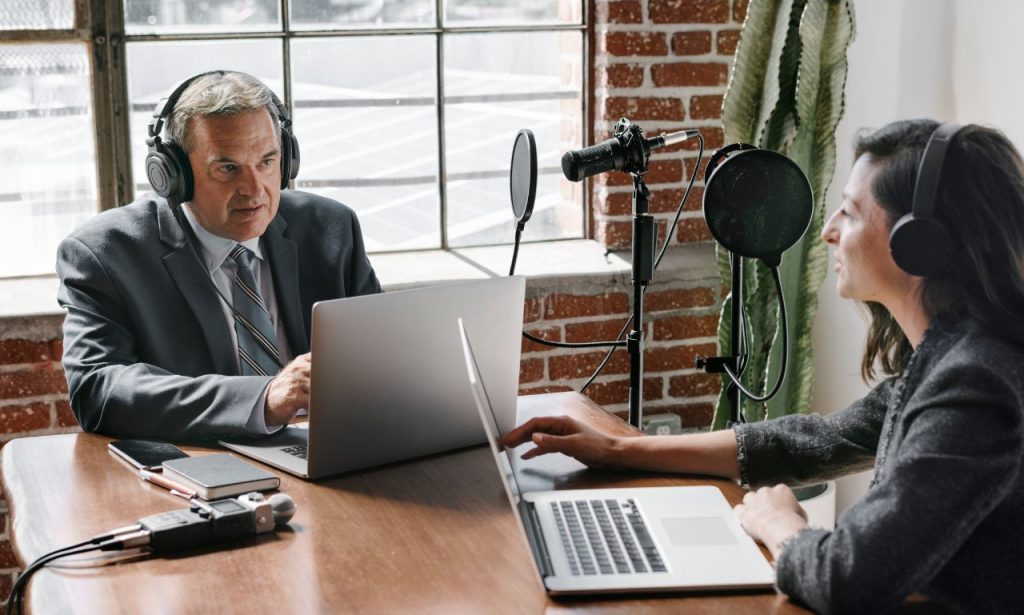Why start a podcast in 2023?
With millions of podcasts available on various platforms, standing out and growing your podcast audience can be a challenging endeavour. However, one effective strategy that can help you reach a wider audience and enhance the overall quality of your podcast is transcription. In this blog, we’ll explore how transcription can play a pivotal role in growing your podcast in 2023.
At its core, a podcast is an audio (or, in some cases, video) program that’s distributed digitally, typically episodic in nature, and available for streaming or downloading on the internet. Unlike traditional radio or TV shows, podcasts offer greater flexibility and accessibility, allowing listeners to consume content on their own terms. Podcasts provide an engaging, informative and entertaining experience for their listeners. They have gained massive popularity in recent years and can be about any particular topic, ranging from business to social issues to culture.
Starting a podcast allows you to share your passion, knowledge, and personal perspective with a global audience, fostering connections and conversations that can be both intellectually stimulating and personally fulfilling. Additionally, podcasting provides a versatile platform for creative expression, offering opportunities for storytelling, education, and community building in a rapidly growing and accessible medium.
Whether you want to begin with Apple Podcasts, Spotify, iTunes or any other podcast hosting site, the beginning stages of podcasts always face challenges in reaching their desired audience. Create your own podcast with the help of Alrite and quickly become one of the most popular podcast players out there!

The benefits of transcribing your podcast content
While podcasts are an incredibly popular and versatile medium, there are situations where their audio-only format can be seen as a disadvantage. Inclusivity is key in the digital age, and providing transcripts for your podcast episodes is an excellent way to make your content accessible to a broader audience. Transcriptions cater to individuals with hearing impairments or those who prefer reading over listening. This not only expands your reach but also promotes inclusivity.
In addition to making individual episodes more accessible, podcast transcripts also give you more opportunities to connect with a larger audience because, unlike audio files, a text file can be consumed anywhere. Reading doesn’t require headphones, a quiet place or a reliable internet connection, so if you want to get your message to as many people as possible, text files are a great solution.
Because podcasts are limited to audio, they cannot include visual elements like images, charts, or graphics. This can be a disadvantage when dealing with topics that are inherently visual, such as tutorials, product demonstrations, or art-related content. Unlike video content, where thumbnails and visual previews can offer a glimpse into the content, podcasts primarily rely on titles and descriptions, making it more challenging to attract new listeners. Due to this, discovering new podcasts relies heavily on audio recommendations or text-based descriptions. Search Engine Optimization (SEO) is crucial for discoverability, and transcription can give your podcast a significant SEO boost. Search engines like Google and Bing can crawl and index text-based content more effectively than audio.
If you’re looking to expand your podcast audience, you should consider posting transcripts of your podcasts alongside the audio files on a regular basis. Transcribing your podcast can also help you create blog posts, emails, infographics and other informative content. It’s also much easier to translate into other languages. By posting transcriptions of your podcast episodes on your website or blog, you increase the chances of your content ranking higher in search results, leading to more organic traffic.

Starting a new podcast? Use speech recognition for your first podcast episode
Making a good podcast transcript is just like making any other transcript. Getting it right takes a lot of time, practice and the right tools. Of course, you can always do it yourself if you have plenty of free time, but the easiest, cheapest and quickest way is to use a transcription program to do the transcription, so that all you need to do is read through and make minimal corrections.
As a podcaster, using speech recognition technology to transcribe podcasts significantly expedites the transcription process, saving you valuable time and effort that can be better spent on content creation and promotion. Not only that, but it also provides you with the option of content repurposing. Transcriptions provide you with a treasure trove of written content, which you can then repurpose into blog posts, articles, social media snippets, or even e-books and watch the subscriptions begin. You can also repurpose the transcripts and make them available via RSS feeds to keep your followers up to date with the latest news and the newest episodes!
You’ll also find that by having the material transcribed, you will have an easier time targeting specific niches or industries. This allows you to reach audiences that may otherwise not have discovered you through audio alone, attracting a dedicated audience interested in your subject matter and helping you grow a loyal fan base.
Efficient transcription of podcasts with Alrite
Alrite is an artificial intelligence speech recognition software solution optimised for both desktop and phone applications, allowing you to record and transcribe audio recordings in Dutch, English, French, German, Hungarian, Portuguese, Swedish and Turkish. And the list is continuously expanding, too!
There are two ways that you can transcribe your podcast files:
- The first is to use the free-to-download Alrite mobile app on your Android or iOS device (such as Apple iPhone or Samsung phone), open the app on your phone and begin recording when you start your podcast. Make sure to select the language of the podcast. Your phone’s microphone will record your voice as you speak and automatically provide the finished transcript once you have stopped the recording. All that is left is to format the text and check for inaccuracies (if any) before publicising the transcript.
- You also have the option of simply recording the podcast and afterwards uploading one of the many compatible multimedia files (.webm, .wav, mp3, .ogg, .opus, .m4a, .wma, .mkv, .mov, .mp4, .wmv) to the Alrite web or mobile app. As in the previous case, select the language of the audio recording and Alrite will transcribe the recording within seconds.
In both cases, minimal post-production is required, as the software is extremely accurate when working with high-quality audio. Any corrections can also be made in the Alrite user-friendly interface, where the system will help you by highlighting any words that were transcribed with low confidence (meaning that the system is uncertain whether they were correctly transcribed). You can then download the finished transcript in one of the most common document formats (docx.).

Podcasting with Alrite’s multiple functionalities
Podcasters will also be excited to know that Alrite is able to tell the difference between several speakers in a conversation, correctly identifying and starting a new line in a dialogue or conversation consisting of multiple speakers. This will in turn make the resulting transcript that much more formatted and easier to follow for the podcaster’s audience.
Alrite also has a complex searching function, where you are able to search for a spoken word or phrase within your transcribed materials. You can type it into the search field to find all the instances in the voice recordings and resulting transcripts where you have spoken the word or phrase.
Want to reach an international audience? Alrite has thought of that too! You can use a third party translator that is accessible within the app to translate into even more languages. Unlock all of these functions and elevate your audio content to new heights!
Free podcast transcription
When you register to Alrite for free, you will receive 1 hour of free time credit, which you can use to transcribe your first podcast episode! In addition to the free 1-hour time credit that comes with signing up, you can also try and use our speech recognition solution for an additional 30 minutes of free time with our monthly renewal Starter package. In the likely scenario that you end up liking absolutely loving Alrite, you can also subscribe to our higher-tier packages. So what are you waiting for? Begin transcribing your podcast today!


